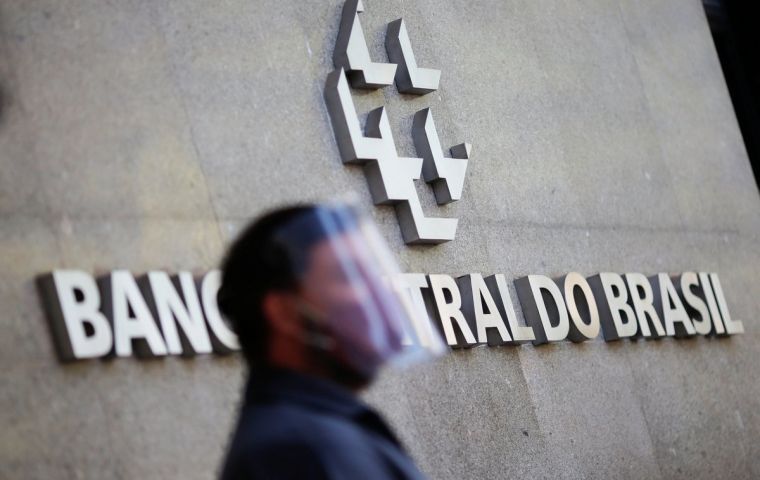MercoPress. South Atlantic News Agency
Fearing a spike in inflation, Brazil hikes interest rate 75 basis points for the first time since 2015
 With 12-month inflation running at 5.2%, well above the central bank's target of 3.75%, Copom said it marks the start of a “partial normalization” process
With 12-month inflation running at 5.2%, well above the central bank's target of 3.75%, Copom said it marks the start of a “partial normalization” process Brazil's central bank on Wednesday announced a first interest rate hike since 2015, a surprising 75 basis point increase to 2.75% and anticipated a similar increase in May to fight inflation even as the economy struggles during the pandemic.
The decision to raise borrowing costs comes at a fragile moment, as a deadly second wave of the COVID-19 pandemic is sweeping Latin America's largest economy. Brazil's death toll and case count trails only the United States, and its economy is on course to contract in the first quarter.
Still, the bank's rate-setting committee, known as Copom, said its decision to raise the benchmark rate from a record-low 2.00% was unanimous, and signaled a hike of the same size at its next meeting unless the outlook changes significantly.
With 12-month inflation running at 5.2%, well above the central bank's year-end target of 3.75%, Copom said in its accompanying statement that this marks the start of a “partial normalization” process for monetary policy.
“Copom members consider that the current conditions ceased to prescribe an extraordinarily stimulus,” policymakers said, noting that inflation expectations are above target for the relevant policy horizon, including this year and 2022.
“For the next meeting, unless there is a significant change in inflation projections or in the balance of risks, the Committee foresees the continuation of the partial normalization process with another adjustment, of the same magnitude, in the degree of monetary stimulus,” they said.
Using market-based interest and exchange rate forecasts, Copom said inflation is on course to end this year at 5.0%, uncomfortably close to the upper limit of its target band.
Luciano Rostagno, chief strategist at Mizuho Bank in Sao Paulo, said markets should welcome the decision to hike more aggressively.
“Front-loading the policy normalization process is a stronger and quicker way of stabilizing financial markets, supporting the real, and minimizing the risk of inflation ending the year above target,” Rostagno said.
“It is a signal to the market of maintaining credibility amid rising inflation risks,” he said.




Top Comments
Disclaimer & comment rules-

-

-

Read all commentsAt 1 : 5.5 currently, this is bad news for Brazil and good news for those with dollars or other 'hard' currencies. I hope we are not heading back to the bad old days of hyperinflation from the 80's
Mar 18th, 2021 - 07:42 pm 0FortHay
Mar 18th, 2021 - 09:23 pm 0Doubtful we’ll see the hyperinflation of the ‘80s unless the PT regains power. Argentina however is in serious difficulties.
The USD however is not as solid as it was before either. Keeping money in savings accounts is not smart either.
Chicureo
Mar 27th, 2021 - 05:43 pm 0Tend to agree, inflation will continue to fluctuate (caused by the uncertainty of the future/recovery of the economy, and Bolsonaro's erratic behavior), but to predicts levels anywhere near those prior to the Plano Real, I don't think so - inflation prior to the Plano Real was hitting 80 to 90% /month .
Today, with the relatively low (historically speaking) inflation rate, the population (at least one whole generation) has become used to the idea of relative stability and the possibility of planning their finances further ahead than one week. If this changes, the govt and politicians will have a riot on their hands.
International investments - productive, or otherwise (speculation, linked to a higher SELIC rate) - have dwindled to near-to-zero levels, which has made the USD far more expensive....which in turn, negatively impacts (directly or indirectly) everything linked to imports.
But getting back to the prime rate (SELIC), afaic, a few more hikes will be welcome.....currently, investments are paying lousy returns, sometimes negative, obliging investors to venture into higher risk to try to beat inflation.....obviously, this impacts the lower classes far more than those better-off, but when push comes to shove, you've got to be pragmatic.
Commenting for this story is now closed.
If you have a Facebook account, become a fan and comment on our Facebook Page!